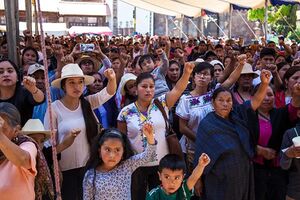Cherán: Difference between revisions
(Created page with "thumb") |
No edit summary |
||
| Line 1: | Line 1: | ||
In progress | |||
[[File:Cherán.jpeg|thumb]] | [[File:Cherán.jpeg|thumb]] | ||
In 2011, the P'urhépecha town of Cherán (in Mexico) kicked out police, politicians, cartels, and logging companies. Since then, residents have horizontally self-governed while protecting their community and forest based on the principle of kuájpekurhikua, meaning "taking care of the territory."<ref>Peter Gelderloos, ''The Solutions Are Already Here: Tactics for Ecological Revolution From Below'' (London: Pluto Press, 2022), 127.</ref> | |||
=Culture= | |||
The ongoing uprising aims to revitalize P'urhépecha traditions and language<ref>Gelderloos, ''The Solutions'', 127.</ref> and to empower all residents including women and LGBTQ individuals. In 2015, a Women's Council and Youth Council were incorporated into the communal government. | |||
In its own words, the Women's Council's objective is "impacting the quality of life for the women of Cherán and their families. To reduce inequality, gender-based violence, sex discrimination, and for full integration into the community." The council organizes lectures, workshops, and gatherings. In 2018, it established the Women's House which, according to María de la Luz, aims "to recover the wisdom of the grandmothers and work with traditional medicine. We have an organic garden and soon will form a women's cooperative."<ref>Scott Campbell, “The Bonfires of Autonomy in Cherán” in ''Deciding for Ourselves: The Promise of Direct Democracy'', ed. Cindy Millstein (Oakland: AK Press, 2020).</ref> | |||
The Youth Council organizes cultural spaces and events as well as school workshops on topics including literature, rap, and preventing addiction. It also works together with the town's 3 youth-run media projects: Radio Fogata, TV Cherán, and Fogata Kejtsitani.<ref>Campbell, "The Bonfires."</ref> | |||
Various residents remembers told Scott Campbell that the LGBTQ community "is viewed as an integral part of Cherán and has had members named to positions in the government."<ref>Campbell, "The Bonfires."</ref> | |||
=Decisions= | |||
During 2011's rebellion, each block made group decisions as residents gathered around the nightly bonfire. Today, these blocks maintain weekly assemblies make decisions by consensus. | |||
=Revolution= | |||
On 15 April 2011, women armed with sticks and Moltov cocktails blocked a logging truck and took five loggers hostage. They were sick of the logging companies and cartels destroying their communal forests. | |||
<references/> | |||
Revision as of 13:09, 13 May 2022
In progress
In 2011, the P'urhépecha town of Cherán (in Mexico) kicked out police, politicians, cartels, and logging companies. Since then, residents have horizontally self-governed while protecting their community and forest based on the principle of kuájpekurhikua, meaning "taking care of the territory."[1]
Culture
The ongoing uprising aims to revitalize P'urhépecha traditions and language[2] and to empower all residents including women and LGBTQ individuals. In 2015, a Women's Council and Youth Council were incorporated into the communal government.
In its own words, the Women's Council's objective is "impacting the quality of life for the women of Cherán and their families. To reduce inequality, gender-based violence, sex discrimination, and for full integration into the community." The council organizes lectures, workshops, and gatherings. In 2018, it established the Women's House which, according to María de la Luz, aims "to recover the wisdom of the grandmothers and work with traditional medicine. We have an organic garden and soon will form a women's cooperative."[3]
The Youth Council organizes cultural spaces and events as well as school workshops on topics including literature, rap, and preventing addiction. It also works together with the town's 3 youth-run media projects: Radio Fogata, TV Cherán, and Fogata Kejtsitani.[4]
Various residents remembers told Scott Campbell that the LGBTQ community "is viewed as an integral part of Cherán and has had members named to positions in the government."[5]
Decisions
During 2011's rebellion, each block made group decisions as residents gathered around the nightly bonfire. Today, these blocks maintain weekly assemblies make decisions by consensus.
Revolution
On 15 April 2011, women armed with sticks and Moltov cocktails blocked a logging truck and took five loggers hostage. They were sick of the logging companies and cartels destroying their communal forests.
- ↑ Peter Gelderloos, The Solutions Are Already Here: Tactics for Ecological Revolution From Below (London: Pluto Press, 2022), 127.
- ↑ Gelderloos, The Solutions, 127.
- ↑ Scott Campbell, “The Bonfires of Autonomy in Cherán” in Deciding for Ourselves: The Promise of Direct Democracy, ed. Cindy Millstein (Oakland: AK Press, 2020).
- ↑ Campbell, "The Bonfires."
- ↑ Campbell, "The Bonfires."
